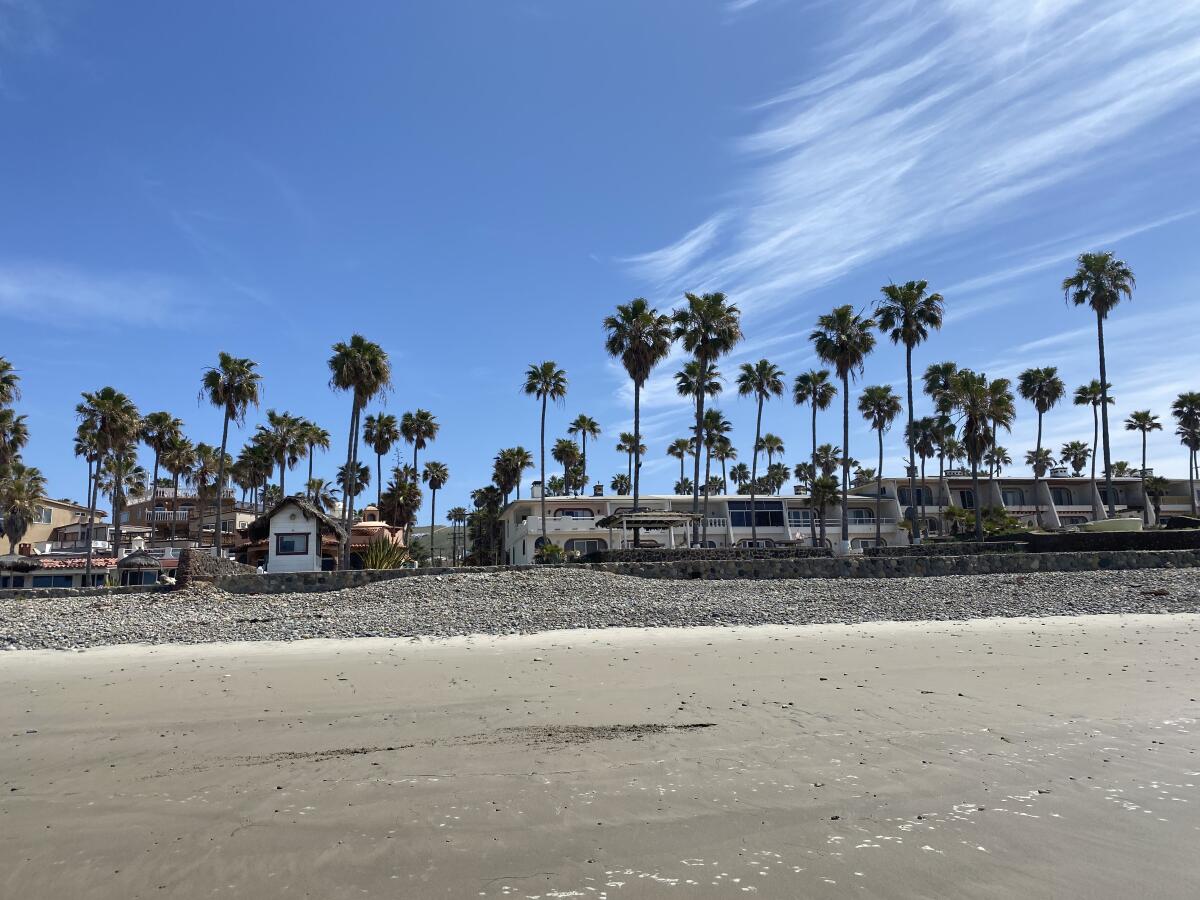Americans are cut off from Baja homes in which many have invested life savings

- Share via
ROSARITO, Mexico — The barbed-wire fencing that surrounds most of Cantamar, a beachfront development about 15 miles south of Rosarito, is barely noticeable against the towering palm trees lining the property and the percussion of nearby ocean waves.
Residents of the luxury beachside community say they’ve had to climb over that fencing just to leave their homes in recent weeks because of an escalating dispute with the property manager. They say that, in pursuit of new maintenance fees, she has blocked the exit, cut off water and gas, and refused entry to guests, maintenance workers and even some residents.
About 40 Baja California residents, many of them U.S. citizens and California retirees, say they’ve completely lost access to their homes.
“I feel like a prisoner there,” said Robert Boyd, a retired attorney from Arizona. “People have all their money invested in the place, and they’re at their wits’ end. They’ll be damned if they’re going to lose their investments or their life savings.”
The complicated dispute 35 miles south of the U.S.-Mexico border illustrates the potential perils of Americans purchasing a Mexican vacation residence or investing in a retirement home there.
Although foreign residents cannot technically own Mexican land within 65 miles of the U.S. border or 35 miles of the Mexican coastline, they can lease and build on land in those areas, owning those improvements for up to 10 years.
They can also purchase land through a Mexican bank trust called a fideicomiso, in which the bank is the trustee and legal title-holder and the foreign buyer is the trust’s beneficiary — who can buy, sell and build on the property.
These loopholes have prompted an influx of U.S. citizens that started in the late 1990s. It’s estimated that 1.5 million Americans now live in Mexico, with tens of thousands residing in Baja California, where they can keep one foot in familiar terrain by hopping across the border into San Diego.

Many are attracted to the carefree Baja California beach lifestyle and the lower cost of living. That’s how so many U.S. citizens came to live at Cantamar, a gated community where the value on oceanfront lots a mere 60 feet from the sand ranges from $40,000 to $300,000, according to residents and real estate listings. Similar properties in San Diego would cost more than $1 million.
The landowner of the gated community development, Carlos Borja Robles, died in 2007 without a will. That left his widow, Ivonne Cortez Avendaño, and his children squabbling over the property for more than a decade, Baja California court records show. In February 2019, a state appellate civil court overturned a lower court’s ruling and ordered the estate of Borja Robles to turn over Cantamar to Cortez Avendaño.
Some residents, including Boyd, contend that the judge may have stretched his authority in awarding Cortez Avendaño land that legally belonged to some residents of the complex. Boyd has lived in Baja for 34 years, and he says he is able to hold title within the gated community because he became a legal naturalized Mexican citizen.
“If the judgment encompasses other people’s titled property, then the judgment is in excess of the judge’s capacity to issue that judgment,” said Boyd.
Cortez Avendaño could not be reached for comment. An email to property manager Zarella Garcia requesting comment was not returned. A reporter was denied entry to Cantamar on Tuesday.
Though some residents say they have been permitted to continue living there since the 2019 judgment, they say Cortez Avendaño and her manager have been escalating their tactics to make it an uncomfortable living arrangement.
“I haven’t had running water for years. When we leave, we’re not sure if we’re going to be able to get back in,” said one resident, who asked not to be identified because he said he feared retaliation by Cantamar’s management. He claimed that cameras watched the residents’ every move.
Some residents say Cortez Avendaño is attempting to collect a new monthly $130 maintenance fee, while others say she wants back payment for the monthly fee dating to before 2007.
“The obligation to pay maintenance is not included in my title, nor was it included in the title of the previous owner, and there is no separate contract that obligated the former owner, and now me, to pay maintenance,” said Boyd.
In January, Boyd emailed the manager, Garcia, to request access to his property within the complex for maintenance workers to work on the roof of one of his apartments, according to an email he provided.
Garcia wrote back that the workers were not allowed to enter the development.
“I reviewed the recording of your message given to our guard. And, just to be clear and to avoid future controversies, Zorro (whoever that is) and Aaron are NOT allowed in Cantamar. It doesn’t matter if they are your employees, they CAN’T come in,” Garcia wrote back.
“Last, you have a piece of land in our campus, so you can come in to see your land whenever you want,” her email continued. “Other people or guests are NOT allowed. If you are planning to sell your land or doing construction work, please make sure you send me an email with your request. Once it is reviewed and approved by the owner, then you can move forward. Otherwise, do not waste anyone’s time.”
Dr. Mike Welch, an allergist physician affiliated with Rady Children’s Hospital in San Diego, said he had been denied entry through the development’s gate for months.
“People who live there are not able to use the house they have been enjoying for many, many years,” said Welch. “There has even been altercations at times at the entry gate between security personnel and residents and visitors trying to get in.”
U.S. authorities say they are powerless to intervene when property disputes involving Americans arise in Mexico. They have warned that Mexico’s murky land-record system exposes foreigners to complex title disputes in courts that may not always be playing by official rules.
The chances of winning a fight in the Mexican legal system are slim, and the process can drag on for decades.
The most notorious example came in 2000 when a 27-year legal battle ended with about 200 Americans being evicted from their retirement homes in Punta Banda, a sandy peninsula south of Ensenada. The U.S. citizens built their homes on ejido, or communal land, and the Mexican Supreme Court ruled that the ejido group that sold the land was not the true owner.
“Who is going to spend a lot of money in court and wait 10 years?” said Boyd. “Most people are older, and in 10 years, where are they going to be?”
More to Read
Sign up for Essential California
The most important California stories and recommendations in your inbox every morning.
You may occasionally receive promotional content from the Los Angeles Times.














